Tags
The Myth of Solid Ground (my book about Hannah, attached as a PDF)
Featured
Posted in autism, memoir, parenthood, writing
Posted in autism, memoir, parenthood, writing
24 Friday Jan 2020
Posted in poem
Tags
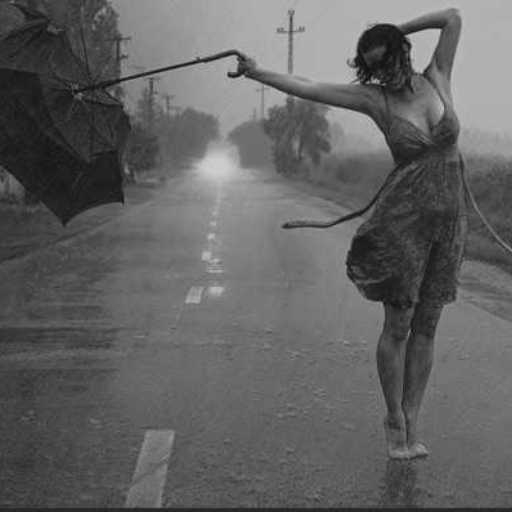
Schrödinger’s cat is dead.
Thank God.
She might have been alive once,
Or twice, or all nine times.
(We had no way of knowing.)
She’s dead by now, though—must be.
Long dead.
Thank God.
Let’s rise from our squat,
For now we may wander unworried,
No longer hunched from listening–
One ear tight against the box–
For her soft, starved meow.
27 Saturday Jul 2019
Posted in politics, random thought, twitter tweets, zen
Tags
My latest axiom: When in doubt, do the moral thing.

17 Monday Jun 2019
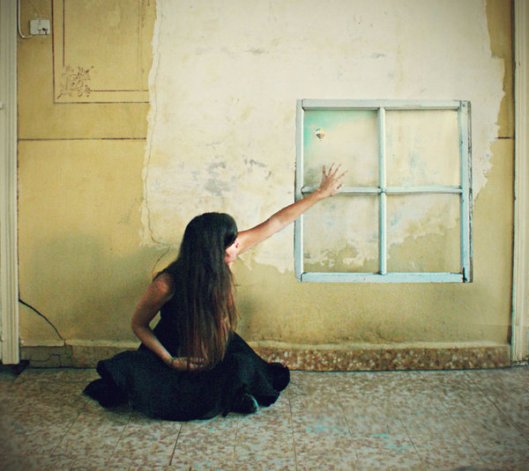
Excerpts from reviews of my unpublished book
… She goes through the mill, all right. No surprise there for fans of such stuff—in Britain they call them “Misery Memoirs,” and demolished mums go mad for them. What is this trend about, anyway—all these haunted women sharing stories with women similarly haunted? When you’re dry to the bone, why crawl out to visit a neighboring desert?
… There seems some universal need for—let’s call it “paying witness.” Which Coughlin does well. She tells the story of her autistic daughter’s life and death with style and wit. It’s really not her fault that we already know the story, thank you, and don’t need to hear it again.
… To quote Ms. Coughlin, “You can’t spell ‘poignancy’ without ‘Nancy’”—and that at least seems true. This book is relentlessly poignant. Every thought this writer has seems blackened at the edges, charred by pain. Even when she’s funny—and believe it or not, she can be quite funny, often at the very moment the ground is collapsing beneath her—a subtle wince behind the prose betrays an unquellable trauma.
… This is the sort of book that should be wrapped in satin, placed in a box, tied with a bow, and cached in an attic for some curious granddaughter to reopen one day, and to recognize.
16 Sunday Jun 2019
Posted in journal entry
Tags
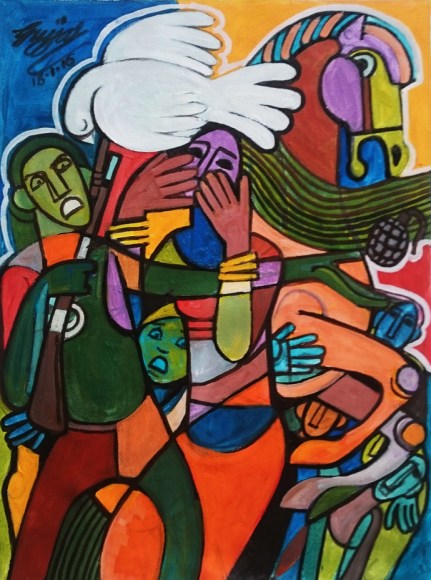
(“Confusion” by Gujjarappa B G)
We live in terror, yes? Not just me this time? Yesterday, I read this: More “deaths of despair” now than ever before. (More suicides. More overdoses.)
More bigotry. More rage. More floods. More droughts. More extremes of every kind.
So many ways the world could end. Bang, whimper, fire, ice. Add another way each day. It’s a race, breathtaking to watch, to see what kills us first. We’re out of “if”s by now; we’re left with only “when”s.
Are we? One thing that blurs my thinking is the fact that every generation (or so) assumes it’s the last. This turns out to be a narcissistic delusion, every time. (So far.) Only now is important, we/I think. The past was just the (retrospectively predictable) build-up to this moment right here, where, as it turns out, I live. Of course my ancestors were wrong—or else I wouldn’t be here now to be so right.
At the same time—and this is the wonder of it, for me—at the very same time I’m assuming my doom, I make plans. I invest in retirement. I buy life insurance. I save my frequent flyer miles to visit cities that may be underwater, or on fire, by the time I get there.
I take long, hot baths. I sip vodka through a plastic straw. I write “slice of life” stories. I have a seven-year subscription to The New Yorker. I look forward to grandchildren.
We live in (t)error, yes? But I really don’t see how to fix it, today, apart from rinsing off my plastic straw so I can use it forever, in every screwdriver I drink.
17 Wednesday Jan 2018
Posted in journal entry
Tags

January 17, 2018
It seems to me lately: My experiences become useful to me only once they become fables. My history can’t help me unless I can find in it a pattern (however apophenic it need be) that I can then convert to mantra, moral, metaphor, answer, lesson, creed. I need to find my way, in short, from the specific to the general: I touched a candle flame just once, and instantly I knew what any Fire could do. If only every event revealed its truth so fast and plainly.
I continue along this path of trying to learn what path’s most useful–by which I mean, “what leads toward grace”–by eliminating, one by one, every dreary dead end. I won’t list them here, each uselessness that blocks each way, but will bundle them all into a crate called “desire” and hurl the crate into the sea, where to my consternation it will continue to bounce and bob in the rough water. (Obviously, I should have weighted it down better.) Now that box of longings will follow my ship as if tethered to it, no matter how fiercely I gnaw at the rope. But this way I know where it is, at least, and can keep a careful eye on it.
Something I scribbled on a post-it note some days ago: “Everything that happens to us is serendipitous. It just takes practice, and maybe a bit of confabulation, to discover and harness it.” So there’s that.
From another day, another scribble: “You know you’re high when you try to light your pipe with a nail clipper…and it works.”
26 Tuesday Sep 2017
Posted in journal entry
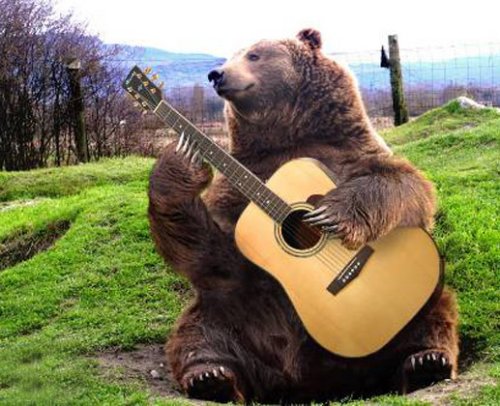
September 26, 2017
Words don’t come. Mind cluttered with choices, so no place to settle. Hands do my translations now, the left a calloused tiller of soil, the right another kind of expert: a sprightly dabbler in patterns and rhythms. I don’t know how either of them do their jobs, and in fact I try not to know. My hands work best unsupervised. I merely turn them loose, then frown or nod at the choices they make. Luckily, we share the same ear, so mind and hands always agree. And through this everyday practice, this playful trial and error, this harnessing of serendipity, the guitarist (all of me combined) makes progress. It’s a game of letting go, a trick of trusting a bodily intelligence my mind can only squint at, and I find myself loving it more, I suppose, than would make sense to most people.
19 Wednesday Jul 2017
Posted in poem
Abbreviated
When making lists, I once wrote “He.” and “Ha.”–
instead of merely “H.”, as I do now.
This luxury of brevity
weighs heavily on me.
First to quaver, mid-list, is the pen.
Its wince shoots sirens to the hapless brain.
(I feel it first. It’s only after
that I revive my daughter.
Or she kills me, it’s either way the same.)
I see her then, in flashes—like the time
she danced out on the roof edge, or
escaped the moving car.
My husband, Henry (hence the “He.”), can’t hear
me in this place I’ve gone. I glimpse him there–
outside my gasp, inside his jar–
then grab for Hannah (hence the “Ha.”).
18 Tuesday Jul 2017

Henryland now
Waiting for Henryland now.
Piano jazz on the family iPod.
Knowing he might walk in
sometime within this very sentence.
Or this one.
…No, not yet, but soon.
Henryland: a funfair
for middle-aged war vets.
I know shortcuts to the sweetest rides,
I know the thrillingest car
on the stroller coaster.
Total access, free chili dogs,
an all-night ticket. No lines,
no crowd. Just my husband, me,
and Oscar Peterson.
Henryland: my latter-day
reward for taking all those classes.
(This thesis took me
thirty years to write.)
Henryland: my recompense.
And in the yard a gallery
of rusted iron: the broken ones.
We don’t ride those anymore.
(People kept getting killed.)
We should haul them to the dump,
I know, but we’re lazy, and, besides,
they’re cenotaphs. They’re modern art.
Someday I’ll write a poem called ‘How
to Love Someone,’ but this might do, for now.
12 Wednesday Jul 2017
Posted in autism, Evolving ideas, journal entry, writing, zen

July 12, 2017
More often than you might think, someone at a party, say, finds it useful to remind me that we may be merely avatars in some alien civilization’s video game. Of course I always say, “of course,” what with the scope of human ignorance being so infinite and all. And if I’m not in a hurry, I might even succumb to a parlor game of what-ifs, which runs sometimes on and on, with other people joining in and imaginations a-go-go. What if we’re part of someone’s dream? What if only I exist? We could be holograms, or twelve-dimensional, or the bedraggled children of God.
I’m patient amid the speculations. After all, it’s all true, for all I know or need to guess. And/or it’s all nonsense. Every sci-fi scenario is just another metaphor for the ineffable. “Truth” itself, like “time” and “I,” is most useful when viewed metaphorically. I myself like to say that life’s ultimate answer is “both,” but even that word’s just another little church-of-one mantra that doesn’t even say what I mean, let alone capture a truth. The idea that my rational mind might manage even the slightest brush-up with (what I may as well call) “reality” —this is my silliest lifelong foible. There’s a reason we need words like “ineffable,” isn’t there? Undefinable, indescribable, beyond words. The notion sits in our vocabulary, underused but plain enough: our mental search for truth is a snipe hunt.
As the Buddhists probably say: we can’t know; we can only be. I think this old truth must have scared me once, and for all I know someday it will scare me again. But these days the never-knowing seems the opposite of scary. I find in it, instead, the sweetest surrender, the soothing/soothful opposite of judgment, attachment, ambition, desire.
For a long time I lived by a mythology of truth and choice. I believed myself a (clumsy) demi-god who knew a few things already and would one day know more, who through ratiocination could lead a choiceful life. But I don’t know anything about any of that anymore—and, for now at least, I’m retired from the business of trying to know. What remains is only the usual hapless tatter, the ragged axiom still clinging to the rod after the drape’s torn down: here and now, I know nothing. Here and now, I choose nothing, I control nothing. I can call myself a sovereign all I want, but even my skin won’t obey me. Not only that, but here’s the thing: it could well be that only through my (abashed but pure) surrender to this self-evidency will I ever, at long last, become whoever it is that (it will surely turn out to be) I’ve been all along.
13 Tuesday Jun 2017
Posted in journal entry, writing, zen

June 13, 2017
So lonely today. Feeling sorry for myself. Feeling ridiculous. Feeling human. Another little comeuppance I wasn’t quite ready for, so I have to cry my way through it to get to the place where I learn to surrender, and from there to the point where I’m able, however feebly, to change myself so that I don’t make this same old mistake yet again, if I can help it.
What happens to me from time to time: I’m talking with my husband, or more likely lately with another, equally male friend with whom I ‘skype’ for three hours every other night. And often these conversations start out great, and I’m a good listener, and I’m asking questions and sympathizing and paying attention even to bugbear sorrows I’ve heard about a thousand times before. And this can last maybe an hour, and I play my part just fine.
But then—what happens? I slip up. I get seduced, by some little detail of his, into disclosing a detail of my own. Or even worse in my friend’s case, I find myself compelled to make a joke or two, to lighten the tone, to note life’s absurdity. And either way, I end up derailing the conversation by leading it in what must seem random, stupid directions. I become suddenly “myself,” of all things. One thought reminds me of another and I can’t restrain my delight in the cornucopia of worlds that any image, any word may lead to. And to my infinite chagrin at such times, I can’t seem to censor myself, so that I begin to talk in almost exactly the same way I think, which is the way of a honeybee flitting from flower to flower to flower. And eventually my conversation-mate, as you might expect, not only can’t follow me, but finds my stream-of-consciousness rambling to be flippant, confusing, and that worst of worst things, boring.
Last night he called me out—my friend, not my husband, who by now has his own, more subtle ways of dealing with my mishegas. (Henry listens for a while, then pretends to listen, then remarks that he’d ‘better get the show on the road,’ then leaves the room.) My friend tries so very hard to quell his own longtime habit of keeping his frustrations (with me or anyone) more or less completely to himself until, BOOM, he finally just explodes in rage. And I know this fact viscerally well, and it’s probably a major reason I chose him as my friend—not just because such manly explosions are so familiar to me (thanks, Dad! :)), but because the only way I know to conquer a useless habit (in this case my habit of fear) is to face it as often as possible, the way an agoraphobe has to force herself to leave her house every day. I have always tiptoed around such ticking-bomb men, tried to prevent such explosions, while at the same time I’ve tried to wean myself from feeling scared by them. Being afraid of angry men is a useless habit, so I’ve been learning (the hard way, as usual) to confront it, to enter the lion’s den anyway, armed with the by-now obvious fact that the lion is loud but toothless.
Nonetheless, I remain ripe for comeuppances like the one last night, when my friend reminded me, at length, of just how useless it is to be my purest self—which is also my most annoyingly self-involved self, if he and my husband are to be believed, as I think they might be. (It’s kind of interesting to note that I can’t remember ever being confronted by a woman with such exasperated vitriol, but maybe it’s just that my women friends were as forced as I was to learn patience at an early age.)
My friend is right about me—but maybe what he doesn’t quite know is that when it comes to self-involved blather, I’m just an an all-too-obvious exemplar of a rampant human vice: the longing to be understood. The longing to be heard even when speaking my own esoteric language. I was trying last night to connect with my friend on my own terms, as dully labyrinthine as they are. But the end result was disconnection, and pain on both sides.
You can’t imagine how hard it was last night to keep from saying, “Yeah, but you’re annoying too sometimes.” Or to trot out my timeworn Charles Lamb quote: “’Tis the privilege of friendship to talk nonsense, and to have her nonsense respected.” But those sorts of responses, experience works overtime to teach me, are counterproductive. They rise merely from pride, from ego, from a stupid need to be “right” all the time. So I let him go on, didn’t argue, let the pain in, cried quietly (a skill I mastered years ago), then told him I was sorry to have been so rude. I even came up with a pretty obvious solution—that I won’t smoke pot with him anymore as we talk, because pot unfailingly plunges me into what my friend calls my “psychedelic” mind, which is, I can’t help but realize, a bountifully creative world where I must live alone.
I don’t mean to be passive-aggressive here. That’s the temptation—to damn my friend’s consciousness by pretending to damn my own. But that’s not what I’m doing–honest. My friend’s consciousness is just fine as it is, and, at bottom, it’s none of my business. I can only work on me: I need to be more graceful. I need to quell my clumsy longing to celebrate my manifold mind out loud. It’s a common little longing, of course—everyone yearns to be known. But it doesn’t work. Ever. I revisited, last night, a loneliness I’ve known all my life. It’s probably the loneliness everybody feels deep down—this nagging awareness not only that no one will ever know me, but that if somehow they did, they’d find me as tedious and incoherent as I assume, deep down, they know themselves to be. We all long for a witness, don’t we? A soulmate, maybe. Sometimes we think we’ve found one, but even a marriage of true minds must admit impediments. I feel myself lucky to be tolerated as patiently as I am by the people forced to know me even as well as they do.
And through all these egoistic ups and downs, I take my best comfort in the knowledge that I love my own company. I’m at my best in one of two modes: compassion for others, or contentment in my own solitude. If there’s a third way life can work, I don’t yet have the grace to find it. I’m as much the petty blowhard as everybody else seems to be. Foolishly I crave to be loved for my weaknesses instead of despite them. I long to be known. Oh, what the hell–I long to be delighted in.
But that never really happens to me in real life. (I wonder if it ever happens to anybody.) And this truth, in short, is what made me a writer. Because even just by typing these words, right now–these bluntly private, boldly anonymous, and only halfway readable explorations into what might really be going on with me–I find myself feeling quite a bit better.
09 Friday Jun 2017
08 Thursday Jun 2017
Posted in journal entry, random thought, zen

June 8, 2017
I played guitar today. It thrills me to see myself getting better–not great, not even “good” yet, really– but that’s not the point. The point is just to play better. As with my whole little life these days, I’m not trying to “win” anything anymore, and in fact I don’t know what in the world would be worth trying to win. Besides love, I guess–but the way you win love is to give it, which is simple enough once the ego shuts up, and hardly worth worrying about. Everything else—everything, yes? Everything else is a game. And maybe love’s a game too, I don’t know. Love’s just the horse I rode in on, and she’s served me so well that I’m bound to ride her home again.
So with love’s possible exception, everything’s a game. But you’re not there to “win” or even to “lose.” You’re only there to play, and if it’s a fun game, like playing guitar, “losing” is a precursor to, and forever concomitant with “winning”: you might as well think of them as inseparable halves of the same activity. With a game like guitar, I’m working hard to beat my best score, but if–every other minute or so–I didn’t fail at that, I probably wouldn’t find it worth the effort. It’d be like, say, driving—a game I’ve mastered well enough, have no reason to “practice” for its own sake anymore, seeing as I’m not likely to get any “better” at it by staying late after school. Driving, therefore, is for me a simple, useful, but rather ordinary game. Breathing too: I imagine I’m about as good now at breathing as I’ll ever be. Hell, for all I know I’m at the utter peak of my aptitude for breathing, and it’s gonna be all downhill from here. But guitar—oh, there are so many levels I haven’t gotten to yet, and then too, there are a few levels I have finally reached, plus many more I can glimpse just a few yards up the hill. Yes, but even the view from right here is breathtaking.
Amazing how fulfilling it is just to play the games of life without needing them to “mean” anything. In my roles as a game-player, singer, writer, a friend/wife/mother/human, etc., I’m always just trying to beat my best score. Lots of times I fail—that’s how a fun game works—so then I push “reset” and start again. The trick—my wisdom of the day–is to stop making the same old mistakes. You can’t get anywhere new that way, as I see it. No, if you really want to beat your best score, then you have to start making brand-new mistakes, and lots of them.
The other trick is not minding the obvious fact–once you think about it for even a second—that all your wins and losses are small and temporary and have barely even the meaning you give them yourself. It’s not—I used to think it was, but don’t anymore–that in the end we all “lose” (picture Trump’s gold-plated coffin). No, I have a feeling, these days, that there’s no end at all. Or that whether there is or isn’t, I myself will never know, so I might as well relax already.
30 Tuesday May 2017
The Myth of Solid Ground: a synopsis
My aim was this: to write the book I longed to read back then, some twenty-five years ago, when Hannah was first diagnosed. There was no internet then, not like now, and the few autism books I could find fit into one of two genres: dry medical texts and anecdotal “miracle memoirs.”
The medical texts worked hard, with their studies and statistics, to mask the fact that science knew (and knows) little more about autism than I did (and do). I couldn’t have discerned that fact back then, of course—and, who knows?—maybe I wouldn’t have wanted to discern it, then. When disaster happens, after all, the first thing you long for, once you can breathe again, is rescue, which, unless you believe in magic or God, would seem to require human expertise. By spending Hannah’s first three years thinking everything was just fine, I’d handily proven my own incompetence. No wonder I deferred, then, to doctors with clipboards, who, with one word, replaced the daughter I thought I knew by heart with an inscrutable enigma: an alien, a machine, an aggregate of symptoms and “behaviors.”
No wonder, too: the rise of the miracle memoir. These books, most of them written by parents who’d fallen through the same dark fissure that had trapped my family, countered the bleak forecasts of medical texts with warm, human stories of hard-won victory.
For this was the era we lived in then. We were, at long last, past the nightmarish age when we spoke of “refrigerator mothers” whose everyday remoteness forced their children into hiding inside stony, silent fortresses of the mind. No, by 1991, the year of Hannah’s diagnosis, we no longer believed that mothers caused autism. What we believed, instead, was that mothers could cure it.
The method of the miracle varied from book to book. Some parents cured their children through a dramatic change in diet, some by megavitamin supplements. Auditory Integration Therapy did the trick for a few kids, while other parents swore by facilitated communication, or chelation therapy, or the magical powers of hyperbaric chambers. Some parents rescued their children via sixteen-hours-a-day, one-on-one behavioral therapy. Several children simply cured themselves, through tireless, undaunted acts of will.
“Can Autism Be Cured?” was the title of a Woman’s Day article my mother sent me in 1994, but by then I already knew the answer, which wasn’t just “Yes,” but “Of course!” The article’s tagline says it all: “From birth this zombie-like girl seemed hopelessly unreachable. Then a simple two-week treatment turned her into a normal young woman.” (And even as I type it out again, that last, triumphant sentence breaks my heart, just a little, one more time.)
For this was what hope looked like in those days, in the era of the hard-earned miracle. The bright half of a false duality, hope rose from a desperate parent’s denial of despair. For me it was a torturous up-and-down cycle–a runaway merry-go-round I finally had to leap off, mid-whirl. I had to learn, through the course of years, to believe in neither thing—not despair, but not hope either. By now, in fact, some ten years gone since Hannah died, I seem able to engage with the world only as it presents itself right now, with whatever might be tangible or provable or present. It’s my life’s deepest lesson, so far—this surrender to the starkly here and now. And it was Hannah who taught it to me.
She never spoke to me, of course–not even in my dreams. Nor does she speak nowadays, but neither, of course, does she need to. Timeless, now, in picture frames and in my heart and mind, she grins, forever my laughing Buddha, and I’m starting, I think, to know what she means. Or perhaps what I realize is that she doesn’t mean anything, she just is, and that’s the point. But I’m getting ahead of my story.
Hannah was born in 1988, to clueless parents who nonetheless thought themselves clever. Trapped already in the fierce and ridiculous melodrama of our marriage, surely Henry and I had neither right nor reason to enlist a third actor. Yet, oh, how deeply into love I fell, when Hannah joined the play. How I studied her—how she and I studied each other. How small the world beyond ourselves became. How quickly her joy became, for me, the only joy that mattered.
As I write in the book: “In our early days—those first three, pre-diagnosis years—Hannah seemed, if not exactly transparent, at least no less knowable than anyone else in my life. Indeed, I believed—and perhaps it’s even somehow true—that she was the person I knew best, back then, and that I played that part for her too. We were the centers of each other’s tiny worlds–yet so often I can’t remember that anymore. I tend to think, no, no, it was mainly my breast she wanted. Whatever else, who knew? And there’s something true-ish about this, in the sense that Hannah and I lived primally—like primates, I mean–in those days. The baby gorilla, as she suckles, gazes up at her mother’s eyes. The mother gazes back. In this brief moment, which will somehow last forever, they are mutually enthralled. This is love.”
How often, in the hard years of Hannah’s growing up, did I worry that that bond of love had broken, or—much worse—that it had never been “real” in the first place. Yet time after time, through the course of years, if I paid close attention, I’d glimpse that bond again.
Again, from the book: “I think gently of an early Sunday morning in the fall of 2003, when Hannah left the house in only her nightshirt, and raced away down the street. I quickly followed her, in my own nightgown and slippers, to her favorite park a block away. The day was warm enough for me to perch atop a picnic table there, pondering the anatomy of acorns, as meanwhile Hannah reeled, in her old rubber swing, from sky to sky. When at last she was ready to return to the house, she nonetheless held back, frustrated, stiff, at the edge of the grass, and I remember, as well as any fine moment that day, the thrill I felt when, at last, I guessed the reason: that the nuts and pebbles dappling the sidewalk and street, hurt the tender bottoms of her feet. I sit here thinking of that moment again, wondering if I can ever explain the joy I felt: the miracle, the bliss of discovering, at last, a problem I could actually solve. I took off my slippers and put them on Hannah’s feet. She laughed—elated as if by a magic trick—and, happily, agreeably, we walked each other home.”
Yet my daughter’s life was turbulent, from the beginning. What’s more—this is an autism memoir, after all—it got harder and harder as time went on. Yes, and suddenly I find myself wanting just to leave you right here–to say, as politely as possible, “You want details? Read the book.” Because I honestly don’t want to tell it again—no, not the merest example or detail. Because that’s why you write a book, isn’t it, so that you can close it, afterwards, and never have to say another word?
One way of seeing our lives in those days: as one long and rarely interrupted state of emergency. Though I hardly knew this at the time, Hannah was what people call a “difficult” baby: fitful, sleepless, often wailing, for reasons that were hard to figure out. She nursed till she was five. She didn’t sleep through the night till she was six (and dosed with Trazodone). Moreover, and increasingly as she grew up, Hannah had bouts of what seemed to be an intense internal pain that no one who worked with her could ever understand, much less alleviate. She banged her head against walls, she bit her own hands, she shrieked and howled, sometimes for hours at a time. Soon she began to turn her frustration toward the people trying to help her—she rushed at us headlong, pinched and bit and rammed her head against us, bent our fingers back, strangled us from the back seat of the car. Her rages grew more dangerous as she grew older and stronger. The toughest times return to me, today, in vivid flashes: locked inside the bathroom, I sit on the floor, bracing my back against the flimsy door as Hannah hurls herself against it from the hallway. The wood arches inward, a wind-billowed sail. Knowing how soon it might fracture, I scan the room for something I might use to deter attack. Shall I throw a towel over her head? Or fling a dixie-cup’s worth of water in her face? If I sprayed air freshener at Hannah, would it hurt her eyes? Would it even slow her down? Would it only enrage her more?
But if this were the full story, I’d hardly have bothered to write it, because any parent who needs to know such harsh particulars has already learned them, with no need for anecdotal reminder. I’ve met so many of these parents by now. Our lives have intersected in support groups, conferences, blogs, real life. Together we form a beautiful, fallible, self-lacerating tribe. By our trembling hands, our haunted eyes, our facial tics, we recognize each other.
Hannah’s rages (if that’s what they were, and not merely what they looked like) reflected only part of her. To know my daughter fully, you had to see beyond your own bruises, and even then, the crazy truth would take you by surprise and you’d believe it only fleetingly. Only once the play ended—when, abruptly, at seventeen, Hannah died of an epileptic seizure in her sleep—and you suddenly had enough quiet (too quiet!) time to think, only then might you grasp the truth you’d only glimpsed before: that all this time you’d been seeing your life upside-down. In your role as Hannah’s teacher, you’d been miscast: you were meant, instead, to play her faithful, if slow-witted, student. As I write in the letter that forms the last chapter of The Myth of Solid Ground:
“It’s amazing, Hannah: your effect on people. What drew them in every time—it wasn’t pity. No, you seduced us instead with what I want to call—don’t laugh—a rare charisma. Do you get what I mean? You startled us all, and kept us startled for years, with the stark purity of your innocence. No matter the moment, you were guileless, sinless, unsulliable–as fully exempt from corruption as the Virgin Mary. No wonder we loved you so dearly. No wonder we took pride in our scars. No wonder we couldn’t help but become, around you, like those ancient tribesmen who’d have regarded you as a spirit guide, a shaman, a gift.”
When I started writing The Myth of Solid Ground, I felt so cockily sure that this wouldn’t be another “miracle memoir.” And now that it’s finished, imagine my chagrin—and my wonder, my dizzy relief–to find that Hannah’s story overbrims with miracle, from start to finish. But how was I to know this, way back then?
I sought to write the book I’d longed to read in those hard days—the book that would tell the bare-knuckle truth, let me bear witness, help me heal. And here, to my amazement, it is.
23 Tuesday May 2017
Posted in quotation, Uncategorized
19 Friday May 2017
Posted in found poem, poem
Tags
chocolate, comfort, cough drops, found poem, play, poem, work, zen
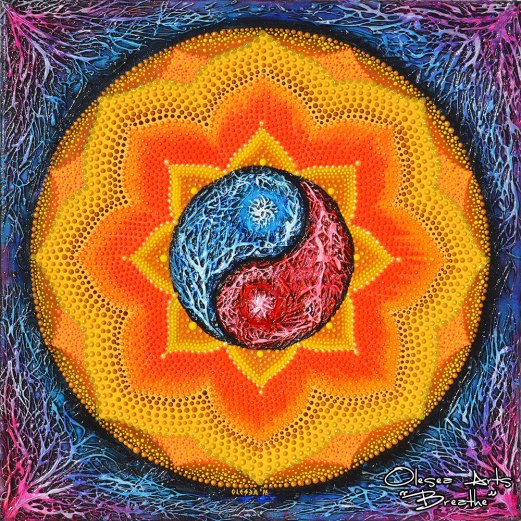
Pep Talks and Promises:
(an alphabetized conversation between Hall’s cough drop wrappers and Dove chocolate wrappers)
Be unstoppable. Be fearless.
Buckle down and push forth. Believe in love at first sight, just in case!
Conquer today. Break the mold, be extraordinary!
Don’t try harder. Do harder! Close your eyes and relax.
Don’t waste a precious minute. Decorate your life.
Dust off and get up. Do all things with love.
Elicit a few “wows” today. Even small celebrations deserve a dance.
Fire up those engines! Feel the sun on your face.
Flex your “can do” muscle. Forget the rules and play by your heart.
Get back in the game. Get a good night’s sleep.
Get back in there, champ! Indulge your sense of amusement.
Go for it. It’s definitely a bubble bath day.
Inspire envy. It’s OK to not do it all.
It’s yours for the taking. Laugh, laugh, and laugh some more.
Let’s hear your battle cry. Listen to your heart and dance.
March forward! Live in the present, forgive your past.
Nothing you can’t handle. Live your dreams.
Power through! Lose yourself in a moment.
Push on! Love like there is no tomorrow.
Put a little strut in it. Send your best friend flowers.
Put your game face on. Simply be, rather than do, for a moment.
Seize the day. Sing along with the elevator music.
Take charge and mean it. Someone is thinking of you right now.
Tough is your middle name. Take time out for a catnap.
Turn “can do” into “can did!” Think of every day as a Sunday.
You can do it and you know it. Think without boundaries.
You’ve survived tougher. You make everything lovely.
15 Monday May 2017
13 Saturday May 2017
Tags

“The most difficult thing is, always keep your beginner’s mind. There’s no need to have a deep understanding of zen. Even though you read much zen literature, you must read each sentence with a fresh mind. You should not say, ‘I know what zen is,” or “I have attained enlightenment.” This is also the real secret of the arts. Always be a beginner.” –Shunryu Suzuki
12 Friday May 2017
Posted in first principles (revised often), quotation, zen
11 Thursday May 2017
Posted in random thought, twitter tweets

When we view the night sky we have two basic choices: to be dumbstruck by infinite chaos, or to superimpose a mythology.
11 Thursday May 2017
Posted in autism, first principles (revised often), quotation, writing, zen
Tags
10 Wednesday May 2017
Posted in politics
10 Wednesday May 2017
Posted in quotation
09 Tuesday May 2017
Posted in first principles (revised often), quotation, zen

“For the unified mind in accord with the Way all self-centered striving ceases. Doubts and irresolutions vanish and life in true faith is possible. With a single stroke we are freed from bondage; nothing clings to us and we hold nothing. All is empty, clear, self-illuminating, with no exertion of the mind’s power.” –Sengcan
09 Tuesday May 2017
Posted in autism, memoir, parenthood
Tags

“To those who may be new to the business of maternal regret: you’ll have to give it up, I think, eventually—if only to calm the gentle friends telling you that no, no, you did the best you could, no one could have seen this coming, you were a great mother. It won’t be an easy surrender. In the first place, forget “great.” Try saying just this, right out loud: “I’m a good mother.” Never mind that you stumble, that you want to change the word “good” to “adequate,” or “not too bad,” or “better than my own mom, anyway.” That you itch to slip in at least a “maybe” or a “sometimes.” Dilute the statement as your shame requires—but only in your mind, and no longer aloud. You’re trying to soothe people, after all.
“Nonetheless, you really will let it go, eventually. I don’t mean the guilt, necessarily. No, for all you know, the guilt will always ebb and flow, in accordance with lunar whim. You’ll get used to it. But what you will surrender, eventually, is the notion that your guilt makes you exceptional. You’ll discover, in fact, that it reveals you merely as a member of a beautiful, fallible, self-lacerating tribe. After all, when in your life have you met any woman willing to admit she’s a good mother?”
–excerpted from my memoir, The Myth of Solid Ground
08 Monday May 2017
(Note: In a world that empowers mere celebrity, self-effacement becomes an act of rebellion.)
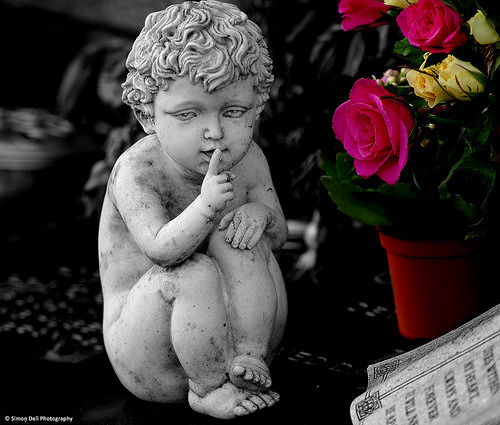
I’m Nobody! Who are you?
Are you – Nobody – too?
Then there’s a pair of us!
Don’t tell! they’d advertise – you know!
How dreary – to be – Somebody!
How public – like a Frog –
To tell one’s name – the livelong June –
To an admiring Bog!
–Emily Dickinson
04 Thursday May 2017
Tags
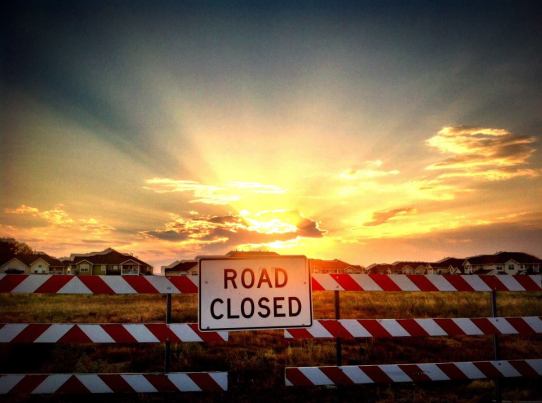
To be without some of the things you want is an indispensable part of happiness. –Bertrand Russell
04 Thursday May 2017
Posted in Evolving ideas, twitter tweets, zen
03 Wednesday May 2017
Posted in autism, journal entry, writing, zen

April 4, 2017
Yesterday a call from the hospital that I need to retake my recent mammogram because there may be something weird happening in the left breast. They’ll do the retest next Monday. It was the soonest time, the woman said, and when I stammered my disappointment, she told me not to worry.
It runs in my family. Or maybe it just walks, I don’t know. My mother got it in her fifties. The doctors removed her left breast—just like mine, I think in sudden solidarity!– and she survived into her nineties before the cancer returned only to discover there was little left to feed it. And my sister Diane, I think. It shouldn’t be such guesswork–knowing if your sister had cancer or not—but that’s the sort of family we are. When we’re sick we’re like dogs. We crawl away, beneath the porch, and don’t want help. Still, I think Diane had breast cancer, but they “caught it in time.”
Something very tedious already about all the clichés attached to this. I wonder if I can get away with skipping them, in favor of fresher feelings. E.g., do I have to say that of course “it could be nothing,” yeah yeah yeah? That we’ll just have to “wait and see”? Or that even if it is cancer, surely they’ve “caught it in time”? What about how the treatments are so much more effective these days, how it’s amazing what doctors can do?
(Glibly:) I think I can handle anything but the clichés. There were so many during the Hannah years, you see. [Hannah was my first daughter. She was autistic.] What do doctors know? Maybe she’ll grow out of it. I see progress!
But I’m getting ahead of myself. All I really know right now is that if this isn’t the life-changing moment, then that moment will simply come later, and maybe it will feel just like this, at first. What I feel: fragility. It’s visceral; I feel fragile in my bones, which I don’t normally even pay attention to. I feel made of thinnest glass. I feel like I should try harder not to bump into things all the time.
In my mind, meanwhile, I’m mainly just curious, for now. I don’t know what will happen, but it might be a fascinating, even a sort of “important” moment for me. But for now I can know nothing. So I put the mammogram-plus-sonogram appointment on the calendar, then live the day I’m in. I’m watching myself closely, but looking outward to do it, at the mirroring world. Colors are vivid, but maybe not more so than usual. Guitar practice goes on as usual, and in fact I found some songs I’d loved and lost, and I credited imker [my Netherlander friend now four years dead, whom I’ve invited to haunt and advise me as necessary] for letting me find them, ‘cause they were delightful. Then later I realized that I ought to let Mom haunt me now, for a while, because breast cancer is more up her alley than imker’s. So all right, I’ll hold tight to her through this.
Whatever this is.
It could be nothing.
————————————————
April 16, 2017
It was nothing.
But it haunts me—my god, I’m so hauntable—or, really, what haunts me is mortality itself. How crazy that I can’t just surrender to it. How crazy, how ordinary.
Mike Elliott died. Two days ago. He was a classmate at St Mary’s, who was very popular and smart and funny, and who liked me and talked to me between classes. We were never close at all, not even close to being close, but I liked him very much, and now, maybe a month after learning he had colon cancer, he’s gone. It seems crazy to me that this should be true. I learned he was ill the same day I learned I didn’t have breast cancer. Maybe only because it’s that time of year, it feels like a Passover story. Death strolls past my house and into his. He was my age, Henry’s age. He’d felt no symptoms. He’d written me a couple of breezy emails just recently about my dubious role in planning our upcoming class reunion.
I’m sure other people from our class have died in the forty years since we graduated. I just don’t know who they are, and likely didn’t know who they were back then. But this guy—Mike Elliott. I didn’t really know him, of course, and I hadn’t seen him in years. But his death resonates because it’s so ‘untimely,’ and because he was always so fully alive in my mind and in his own, and because it seems he somehow represents my high school years. He was one of those lifeline people back then, along with Mike Radigan, Sue Duffy, Paula Morris, Aneida Jackson—that tiny set of semi-friends whose quirky minds I liked to be around, who made me feel a little more at home in that otherwise foreign place and time. Awful, that time. It really was, you know, for me. I could say it to them now, I guess. I think sometimes about doing that, using the “class memory book” I’m supposed to be compiling(stories from everyone, not just me) to come clean about how awful high school was for me, how ugly and foreign and unlovable I felt.
Thing is, though: I’ve gone through so much more since then. So much that was, for lack of a better word, ‘worse.’ Hannah. Hannah. [My daughter died twelve years ago.] My poignant little palindrome. High school was nothing compared to those days.
And right now as I sit here, I’m supposed to be writing something, or editing my agent letter. In honor of Easter Sunday, you see, I’ve decided to rise from the dead. Turns out that’s not quite as easy as it sounds.
I’ll write in this little journal. I’ll write things that don’t ‘count’. Huh, and note how I react to that notion: an anger rises. I find I hate the idea of things either counting or not counting. I hate the judgmental rigmarole—why do I have to be a famous writer, anyway? When I was six, I wrote because I loved it. I loved to write in the same artless way I loved to sing. I wrote, I sang, I dreamed the livelong day. It didn’t occur to me then to wonder whether what I was doing was important or glamorous or self-defining. I didn’t do it to impress anybody—not really. I didn’t even know writing was supposed to impress people–not beyond a round of applause for the school play, I mean–and I surely didn’t know it was supposed to be a competitive sport, not until the silly little shark pit that was grad school.
(Even now, the notion of a “famous author” still feels silly to me. Oxymoronic.)
Why do people want to be famous? Why do they even want to be ‘read’? History and common sense agree that it rarely makes you happy. Yet I myself have always been asked and have asked myself the contrary question: why don’t I want to be famous? Why don’t I care whether anyone ‘reads’ me? I’m the odd one out in this game. I’m the light hiding under the bushel basket. What people don’t ever seem to consider is that bushel baskets nest like matrioshki dolls, that when you come out from under the first one, you find yourself merely in the next one, just as dark and anonymous, but a trifle bigger and thus less cozy.
We’re all anonymous eventually. I don’t know why we fight it so.
Beside my bed there’s a picture of me at around the age of four. I’m in my snowsuit, my rubber boots, a hood tied by a string beneath my chin. I’m also wearing (my hands are ensconced within) my furry white muff. I loved wearing that muff—do they even make them anymore?—for the sweetest simplest reason: nobody could see what my hands were doing. Not that my hands were doing anything people would care much about. No. Johnson and Johnson—I named my hands after the baby powder—were just holding each other or forming a bridge or dancing or posing in prayer. All the same, their privacy was delicious to them.
I’ve always been that way. I’ve always loved cubbyholes and closets. The hiding place behind the water heater. The cave beneath the grand piano. I loved the park and forest trails most when no one else was there, and I could play out my save-the-world fantasies with purest panache.
I have an ego. A huge one, in fact. Honestly, I think I’m amazing. I just don’t seem to care much whether anyone else knows about it. Can that possibly make sense? That is, am I crazy, or is it everybody else? All my life I’ve lacked what they call ‘ambition.’ But I write the books, don’t I? I’ve written three books in thirty years. Thirty very distracting years, I could add (but won’t). Most people never write even one book, so far as I have noticed. I am who I am. The world (which by now is mostly an old voice in my head) expects more of me. The world wants me to come out from under my bushel basket only to entrench myself in theirs. Am I wrong to find that ridiculous?
Irony: if I let them go—all those voices urging me to want to be read—I’d probably write better, and certainly more often. The joy of it would be so much more full and pure. I don’t know why I can’t just follow my own path, why I always have to doubt what (I think) I know to be true for me. Next to the picture of me in my snowsuit and muff is a picture of Hannah—the iconic one, when she’s two and standing balanced on the folding chair. It’s only at this exact second that I realize how alike we look in our poses, how we share the same sly sidelong glance, as if we know a secret no one else would understand, as if we like it fine that way, as if we’re here but also somewhere slightly else–two smiling, dimpled girls content to be unreadable.

30 Sunday Apr 2017
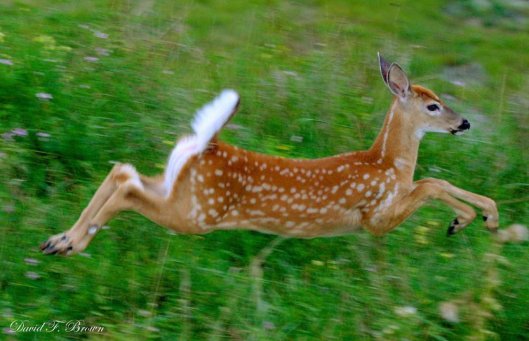
Clearing
I’m watching her: this part of me who thinks
and writes (occasionally at once). She’s
onto something new, she thinks. And maybe
she is, I don’t know. What I like best
is the joy I feel her feeling as she races
through her trance. I don’t want to startle her
in this sudden clearing, don’t want
to make my presence known, for fear
she’ll lose her train of thought, for fear
she’ll notice me and blush bright red, like
that time her brother Jim walked in on her
pounding out the piano solo from Cat Stevens’s
“I Think I See the Light” onto her bedroom desk.
Don’t mind me, little one. Keep going. Make
mistakes, change fast and slow, follow
your thought the way I follow you. We’ll both,
we’ll all, be here to help you home again,
when time comes round for that.
30 Sunday Apr 2017
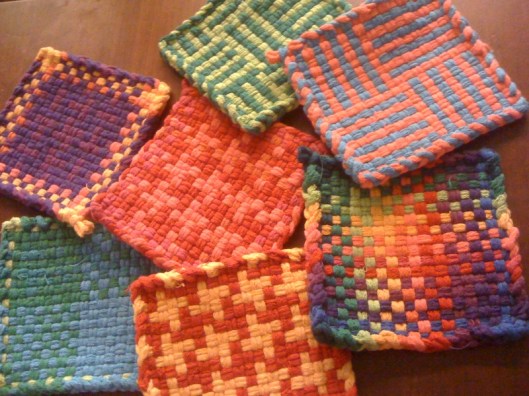
And so I start blogging again. Who knows why, exactly? All I know for sure is that I don’t really care if anybody actually reads this thing or not. This is the part of the trip I’m on now–the part where I realize that I just happen to like weaving potholders (my usual metaphor for making “art”), and that’s the end of it. I don’t really see the need to set up a stand on the sidewalk and advertise those potholders to passing motorists. No, only the weaving matters, and in fact once I’ve “finished” the things, I hardly even look at them again. I’m restless to move on. I seem finally to have learned this about myself.
Every other Sunday morning, I co-host a two-hour radio show on a tiny local station, and for days beforehand I find myself working crazily hard on the themes and playlist, because the planning, for me, is the fun part. Learning new songs, resurrecting old ones, dipping into the histories of genres and the lives of pioneers. Then Butch (my friend and co-host) and I do the show, play songs and talk about them, and all that’s fun and fine–especially when it’s my turn to work the sliders and buttons! But it feels more like aftermath than goal. For one thing, I’m pretty sure that on any given Sunday, anywhere from zero to maybe a dozen people are listening to us at all. It’s soothing and freeing, that anonymity. It’s a lot like the feeling right here and now, in fact, as I type this. There are so many, many blogs out there that only a tiny, mostly accidental group of people will ever glance at mine.
So I’m free. Forgive me for saying so, but it doesn’t seem to matter to me whether the reader (that’s “you,” by the way) exists at all. It’s actually more useful, in fact, to imagine myself alone. After all, I’ve served a lifetime as my own favorite and most loyal witness. By now, I can be “you” just as easily as you can. I ‘m finally learning that, for me, the best joys lie in practice, not performance.
From today’s diary:
I’m getting better at seeing who I am, and being a witness to myself instead of a judge. To throw away the judge, you know, you first have to have an impeccable confidence that you don’t need him anymore, that his absence won’t inspire some personal spiritual crime spree. I think I can safely say that much, for now. And anyway I’ll never really lose that judge, and probably I’m built so that I can’t. So I’ll be witness to this too; I’ll listen to my daily self-chastisements, and wonder how the part of me who still believes they’re true gets through the day.
09 Thursday Feb 2017
Posted in twitter tweets, zen
02 Thursday Feb 2017
Posted in poem
Tags
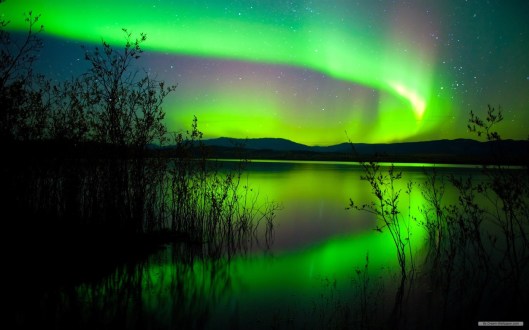
Under One Small Star
My apologies to chance for calling it necessity.
My apologies to necessity if I’m mistaken, after all.
Please, don’t be angry, happiness, that I take you as my due.
May my dead be patient with the way my memories fade.
My apologies to time for all the world I overlook each second.
My apologies to past loves for thinking that the latest is the first.
Forgive me, distant wars, for bringing flowers home.
Forgive me, open wounds, for pricking my finger.
I apologize for my record of minuets to those who cry from the depths.
I apologize to those who wait in railway stations for being asleep today at five a.m.
Pardon me, hounded hope, for laughing from time to time.
Pardon me, deserts, that I don’t rush to you bearing a spoonful of water.
And you, falcon, unchanging year after year, always in the same cage,
your gaze always fixed on the same point in space,
forgive me, even if it turns out you were stuffed.
My apologies to the felled tree for the table’s four legs.
My apologies to great questions for small answers.
Truth, please don’t pay me much attention.
Dignity, please be magnanimous.
Bear with me, O mystery of existence, as I pluck the occasional thread from your train.
Soul, don’t take offense that I’ve only got you now and then.
My apologies to everything that I can’t be everywhere at once.
My apologies to everyone that I can’t be each woman and each man.
I know I won’t be justified as long as I live,
since I myself stand in my own way.
Don’t bear me ill will, speech, that I borrow weighty words,
then labor heavily so that they may seem light.
Wislawa Szymborska
02 Friday Dec 2016
Posted in quotation
Tags
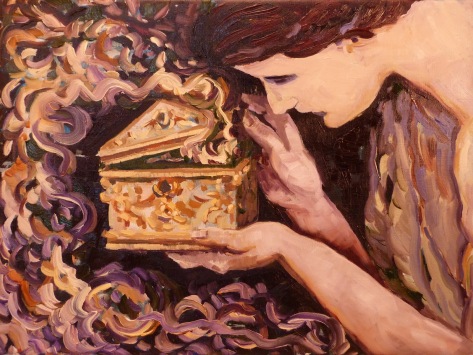
“From Pandora’s Box, where all the ills of humanity swarmed, the Greeks drew out hope after all the others, as the most dreadful of all. I know no more stirring symbol; for, contrary to the general belief, hope equals resignation. And to live is not to resign oneself.” –Albert Camus
(painting by Addie Hirschten)
01 Thursday Dec 2016
Posted in poem, Uncategorized

In these times
I’m fifty-eight. You’d think I’d know by now
these lessons I keep having to relearn.
The latest, loudest fact: the earth sags low
beneath the weight of idiots who mourn
an age that never was. And am I one
of them? Again, my trademark insipidity:
that life is good—and people too–deep down.
I’m Anne Frank in the annex, always pre-
annihilated, trapped in reckless faith–
“in spite of everything”–that men are good.
(Her “everything,” like mine, included death
but not the grin beneath the hangman’s hood.)
I fear my hope more than I fear my dread.
I think like children think, forever caught
in fairy tale, in prayers my mother said,
in “progress,” in “my country,” in the thought
that savagery’s a glitch, a rare malfunction.
What will it take, I wonder, to dispel
my dull naivety? My own extinction?
Or is delusion requisite to hell?
22 Tuesday Nov 2016
Posted in Evolving ideas, Uncategorized
This is for Mary–my gentle friend and sister to my soul.
Like a lot of us these days, you long to understand why our nation is so polarized now, at a time when, as you quite rightly say, “both ‘sides’ need to listen to each other!” I know you mean it when you ask me to “comment” on your worries. Still, I hesitate.
For one thing, I used up all my weekend brainpower making up the song list for yesterday’s radio show with Henry. I chose songs that depict what I might as well call “the male predicament”: songs about what it might mean to be a “strong man” in our society, and they included as many points of view as I could fit into a two-hour show–from Bo Diddley’s “I’m a Man” to Will Smith’s “Just the Two of Us” (a sweet rap about fatherhood). It was a lot of fun, and it also, come to think of it, served as yet another experiment in compassion, for both Henry and me. Thus, all weekend (and, what the hell, all my life) I’ve been groping with the very question implicit in your facebook post: how do we empathize with people who see the world from angles completely foreign (and all too often repugnant) to our own?
For the show, Henry and I each chose a song from our childhoods that exemplified for us, in those old days, the “ideal” man or woman. It turns out that, when I was a kid, my ideal man was epitomized by Jimmy Dean’s “Big Bad John.” Henry’s childhood dream-date, meanwhile, lies captive within the lyrics of Tammy Wynette’s “Stand By Your Man.” We played both those songs and then talked about our picks. My childhood’s ideal was a huge, physically omnipotent man–more “icon” than “human”–who remained a stranger to everyone who met him, who never spoke or expressed an emotion, whom other men worshiped but also feared, and who ended up sacrificing his unknowable life in order to save the lives of his crew. Henry’s ideal, meanwhile, was a woman of endless love and loyalty who never questioned her own dull premise: that the opposite sex is no more than a walking catalog of selfish and incomprehensible behavior that must always, always be found acceptable.
No wonder we grew up so screwy. Both songs are great, I think, and certainly both embrace such virtues as loyalty, strength, self-sacrifice, even love. Otherwise, though, look at the picture. Henry–I think he’ll concede this point–is not Big Bad John, nor would I ever want him to be. After all, thank heaven Big John died young, because, wow, just imagine how boring he’d be to grow old with. Meanwhile, I became a “stand by your man” sort of woman only once I fully realized that I’d finally found a man worth standing by–a man who, not coincidentally, stands by me too.
Henry and I have walked a long tough road to get to this place of (relative) equilibrium. And I mention it, I guess, because it’s the same sort of road we all have to walk, every day, all our lives. In our 30-year marriage (which, for years, we’ve dubbed “The Endless Conversation”), Henry and I have never allowed ourselves (much less each other) a place to plant our feet and say, “This is as far as I go.” No, like it or not, we just keep on moving–evolving, regressing, evolving again… In each of us, you see, there’s still that little kid self-haunted by gender rules that don’t really fit anybody, much less the peculiar likes of us. We’re each still self-taunted by absurd but bone-deep archetypes we were taught to want or to become, but which simply don’t make sense anymore, if they ever made sense at all. It’s a tightrope path–this trek toward mutual sanity–but we keep stumbling along it, if only because we’ve left ourselves, and in doing so have left each other, with no other choice.
Anyway, my point (and I do have one!) is that America is like a marriage. We have to keep talking and listening, empathizing with the other’s pain while never letting go of our own best values, and never ever feeling too afraid to challenge anything that seems to us intrinsically wrong and/or absurd. It’s almost certainly true that, as your post suggests, “both sides” of America (though there are really many more than just two sides, of course) need, metaphorically speaking, to meet with a marriage counselor and talk this whole thing out like reasonable adults. As to whether it’s simply too late for that, or whether it’s never ever too late–I honestly don’t know. All I do know is that our national therapist has her work cut out for her, because America’s disagreements this time are so huge and so personal that the gap between us seems unbridgeable.
Here’s a strange and more or less unprecedented fact of my lifetime: The rise of DJT (I still can’t say his name–that’s how deep this goes for me) seems actually to have made half the country physically ill. Everywhere I listen or read, I hear from people who feel like they’ve been “kicked in the teeth,” who live with a “knot” in their throat, or a “permanent migraine,” or a fear so primal it keeps them from remembering what hope, much less patriotism, used to feel like. As for me, the election’s impact was just as visceral. It plunged me (almost literally) back into a moment when I was six years old, playing in the yard, and Paul K., a kid from down the block, came over to where I stood (I was singing “Que Sera Sera” and braiding dandelions through my hair), and punched me–really hard–in the stomach. (His irrefutable explanation: “I always wanted to see what it felt like to punch somebody in the stomach.”)
This isn’t normal. That is, I don’t normally feel punched in the stomach when my candidate loses. Even eight years of George W. Bush (who was, to my mind, a dangerous idiot) never made me feel the way I feel now. And the fact that (at least) half the country feels similarly–that we’re suddenly bonded by a shared sense of deeply personal violation–has given me a mirror worth looking into as deeply as I can.
As I write to you, my mind keeps returning to a thought I’ve heard a lot lately–something along the lines of “If you’re not worried these days, you’re simply not paying attention.” And that thought leads me to memories of other American moments that deserved more attention than I could afford to pay at the times they happened. Basically, I was so busy fixing the holes Hannah made by ramming her head into walls, that I barely had time to notice holes in our economy, holes in the ozone layer, holes in our democracy itself. But for better and worse I’m less busy these days, so I can afford to spread my compassion a bit further than my own battered living room. It may be, in fact, that I actually have space in my heart now for all of America–not only for my family and the other tribes I belong to, and not only for that much larger group of Americans–people of color, Muslims, Latinos, Jews, the disabled, the poor, the LGBT community, other women (in short, the usual suspects) who will be hurt far more deeply than I will by this deeply anti-American moment.
But my heart makes room, too (for it’s been stretched out a lot over the years), for the people who’ve been shoved by economic and societal changes into a despair so deep and self-contemptuous that they can’t help but long for scapegoats (see the above list) and saviors (see who they’ve chosen; see who and what the man they’ve chosen is choosing). I’m talking here about an underclass of people so seldom acknowledged, so often ridiculed, so little valued that this election seemed to them, as I’ve come to read and understand, their last and only “chance to be heard” before they drown.
For such people, the American dream has turned nightmare, and I think I know a tiny bit about how that might feel. It’s true, they’ve made a terrible mistake–in brief: they’ve elected someone who will almost certainly make their hard lives even worse–but I’ve been where they are, and done what they’ve done. In times of my own despair, I’ve longed for both scapegoats (who, in my case, took the form of benighted doctors, quack therapists, a country that refuses to support its neediest citizens), and saviors (e.g., that cohort of fraudulent or well-intentioned “experts” who assured me they could “cure” or at the very least “help” my daughter).
I can interpret the voice of that underclass, I think, even when it emerges as a primal howl. I can feel the terror on “both sides” as we confront a future that’s left both feeling, as the catchword says, “disenfranchised.” We both, we all, feel so deeply betrayed by our country these days–that’s what it comes down to, isn’t it? And now, or anyway soon, we need to work together–somehow–to actually build the America so eloquently and emptily promised to us by our founders, the “ideal” America we all pledged to believe in when we were kids.
In all honesty, the only group of voters I still can’t understand are the ones who voted for Trump and then, having quickly locked their car doors from the inside, drove safely home to gated communities, comfortable homes, successful careers, and a whole lot of money they’d just as soon, thank you very much, not pay taxes on. These are the only members of “the other side” I still need to hear from, in fact–but they’ve been keeping their thoughts to themselves, at least when I’m in the room. (Occasionally they break their silence to shout, “I’m not a racist!” but that’s as far as the conversation’s gone, so far.) Such smart but tiny-hearted people, it turns out, are also part of the family I hold in my heart, and have been holding, all along. Which is maybe why they scare me most of all.
So, anyway, that’s my comment, I guess.
Much, much love,
Nancy
22 Tuesday Nov 2016
Posted in twitter tweets, Uncategorized
13 Sunday Nov 2016
Posted in poem, Uncategorized

Roar
The furnace roar enthralls me, and the silence
that comes before–and follows–also soothes.
By turns, by force, they beg my acquiescence
to all that’s merely “being,” merely “truth.”
But the wailing mob—how ought I feel? The din
of eight billion curses and sighs. The shriek
of the shrinking world, the whisper-whine
of conquered species, conquered earth. They speak
in hurricanes that moan, in floods that spew,
in droughts that sneer at our inanity.
Yet we can’t translate, though they force us to.
(Our purest faith: Divine Cacophony.)
They’re growling to themselves alone, we think—
or speaking, yes, but saying something else—
completely else, all forms of else! (We’ll sink
while never knowing that we’ve drowned ourselves.)
It’s not our fault. We’re deaf, or worse. We’re dead
to any but our tribe’s vernacular
(which even God calls gibberish). I said,
“The furnace din enthralls me.” I don’t care
to know its source and cost, it seems. I close
my eyes to trace what paths my dreams may take,
as Silence, like a patient prince who knows
his sovereign destiny, remains awake.
07 Friday Oct 2016
Posted in poem
Fifty
Sometimes it seems I’m every age at once:
not in memory merely, but in form,
like Russian nesting dolls with just the latest
mother breathing out. Or like a tree
with fifty rings, so that even my seedling
start remains, swaddled by its future
matrioshki; comprising, still, the marvels
of its quick, brave year in the sun.
07 Friday Oct 2016
Posted in poem
I feel you now
(aan mijn imkertje)
I prayed you’d let me feel your presence here
as fiercely as I feel your absence. You,
imaginary guru, heard this plea,
condoned my wish. I feel you now, more true
than life, for even as I take my rest
in you, I’m wrested thence. I’m all at once:
so utterly aggrieved, so thickly blessed–
so blinded by your panoramic glance.